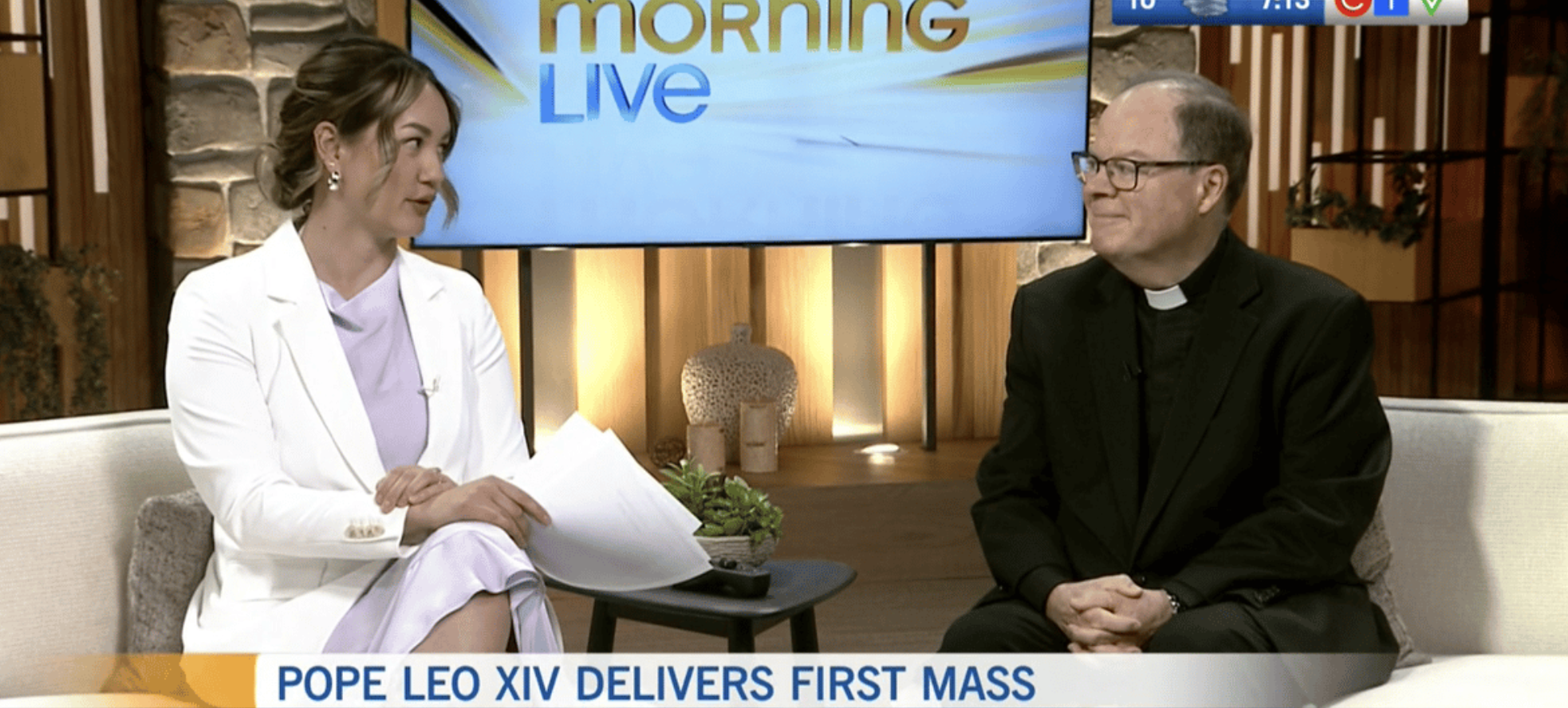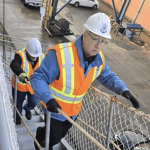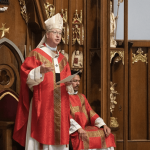VANCOUVER — Archdiocese of Vancouver officials found themselves in demand by Vancouver media following the surprise election of 69-year-old American Cardinal Robert Francis Prevost as the first pope from the United States.
The announcement of Cardinal Prevost and his taking the name Leo XIV was generally met with excitement and cautious optimism within Canadian Catholic circles, where leaders shared personal connections to the new Pontiff and offered their thoughts on what his papacy might bring.
Monsignor Gregory Smith, vicar general of the Archdiocese of Vancouver, expressed his surprise and enthusiasm at the College of Cardinals’ choice. Speaking to media shortly after the white smoke signaled the selection of a new Pope, Msgr. Smith noted that while Cardinal Prevost hadn’t been seen as a frontrunner, his global experience made him a “universal choice.”
“An extended quote of a couple of sentences would work well here,” he told interviewer at media outlet.
Msgr. Smith outlined for media the Pope’s deep missionary roots in Peru and his leadership of the worldwide Augustinian order from 2001 to 2013. Although he is American-born, the new Pope is not seen as a regional or national figure, Msgr. Smith said, but rather a man who has served all over the world and is fluent in Spanish, Italian, and English. His first public words from the central loggia of St. Peter’s Basilica — spoken in Spanish and Italian, but notably not English — were seen as a deliberate effort to underscore this universality.
A recurring theme emerging in media interviews with Msgr. Smith and Archbishop J. Michael Miller was Pope Leo’s identity as a missionary, which both suggested is perhaps the most defining characteristic of the new Pope.
Cardinal Prevost spent years serving in South America, leaving his home country to live out a vocation centred on reaching people where they are, which, according to Msgr. Smith, embodies the modern Catholic call to be “missionary disciples” — Christians who actively share their faith not only through actions but through words.
The Vancouver vicar-general noted that Pope Leo XIV’s election indicates a shift toward a “missionary age” in the Church, rather than one focused entirely on institutional maintenance. He described the new Pope’s vision as a continuation of Pope Francis’s emphasis on outreach to the marginalized, the poor, and the spiritually disengaged, especially in parts of the world like Western Europe and North America where traditional Christian values have waned. Pope Leo’s missionary background positions him as a leader well-suited to re-evangelization of the modern world. A lot of paraphrasing here but I suspect some of it could be direct quotations.
Archbishop Miller reiterated those sentiments in an interview with, describing the Pope’s first words — “Peace be with all of you” — as carefully chosen to convey a message of spiritual reassurance. Archbishop quote here? Possibly from the next sentence?
The archbishop said the greeting, borrowed from Christ’s words to his disciples after his Resurrection, reflect Pope Leo’s desire to offer inner peace in a time of global anxiety. The pope’s decision to quote St. Augustine, “With you I am a Christian; for you I am a bishop,” he said, also pointed to his understanding of the papal role as one of service, grounded first and foremost in shared Christian identity.
The selection of the papal name Leo XIV also carries weight, both the Archbishop and his Vicar-General said, as a continuation of Pope Leo XIII, remembered for his focus on social reform and justice. By invoking Leo XIII’s legacy, the new pope is signalling his intention to engage not just the spiritual life of the Church, but also its role in broader societal issues, they said. A quote from one of them here?
For Msgr. Smith, the name choice also reflects a belief that the Christian message should influence how people live together in community, addressing not only personal morality but systemic injustice.
Despite his American origins, Pope Leo XIV appears intent on distancing himself from national affiliations, both men noted. The archbishop pointed out that the new Pope did not mention the U.S. during his initial address and spoke primarily in non-English languages, further distancing his identity from American politics.
While acknowledging that Cardinal Prevost had previously been critical of certain U.S. government policies — particularly regarding immigration — the archbishop believes Pope Leo will avoid direct confrontation with specific political administrations, in keeping with the global, long-term focus of the papal office. “Does he have a good quote you can insert here?”
Both Church leaders were also asked whether Pope Leo would follow in Pope Francis’s perceived progressive footsteps. While careful to avoid political labels, they emphasized continuity in concern for the vulnerable and marginalized. Still, as Msgr. Smith noted, “A new Pope sings a new song,” and while Leo’s pastoral heart and missionary zeal align with his predecessor, the Church can expect unique personal emphases as Pope Leo XIV begins his tenure.
In short, they said, Pope Leo XIV’s election signals both continuity and change, and while his American birth is historically significant, it’s not defining. Rather, his missionary background, commitment to social justice, and call to re-evangelize the modern world suggest a papacy deeply rooted in the Church’s traditional mission and oriented toward the future, the two men told their interviewers. For Catholics around the world — and in places like Vancouver, where his legacy already has personal resonance — his leadership marks a new chapter of peace and purpose during a Jubilee Year of Hope, they suggested.




